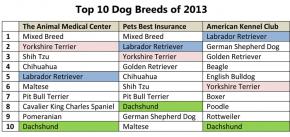Are mixed breed dogs healthier than purebred dogs?

Are mixed breed dogs healthier than purebred dogs?
Veterinarians hear the question all the time: are mixed breed dogs healthier than purebred dogs? And of course, it is our business to know. Because there is much contradictory, and unreferenced, information on the internet, I’m going to offer my stance backed by peer-reviewed research in this blogpost. I would argue that neither group is healthier; the two groups are simply prone to developing different diseases.
No Difference in Lifespan Between Mixed Breed and Purebred Dogs
In a study of more than twenty thousand dogs, a group of veterinary researchers studied factors impacting canine longevity at private American veterinary clinics. They found that large dogs had a shorter lifespan than small dogs, a factor reported in several other studies as well. Since purebred dogs can be both small and large, these researchers adjusted their data for that factor and still saw no difference in lifespan between mixed breed and purebred dogs. Because the dogs in this study were from primary care practices, they more broadly represent dog-dom in the United States than studies of dogs seen in other countries, at specialty or teaching hospitals and from information gathered from insurance databases. The good news for pet owners is, on average, the dogs in this study lived over 15 years.
Breed-Specific Causes of Death
Another group of researchers mined a medical records database shared between 27 veterinary colleges to retrospectively study cause of death in dogs, including breed associations. Over seventy thousand dogs were analyzed in this study. Cause of death varied with breed and reflected many known breed-related disorders. For example, the most common cause of death in dachshunds was neurologic disease, likely from the frequent back problems associated with the breed’s elongated spine. Golden Retrievers had the highest percentage of deaths due to cancer, another commonly reported breed-related problem.
Small breed dogs lived longer than large breed dogs, confirming the information I discussed above. The cause of death in small breed dogs was often a metabolic process, such as diabetes. Musculoskeletal disorders were a top cause of death in large breed dogs. Traumatic injuries causing death affected both large and small breeds at an equal rate. All this information supports my contention that different breeds may be susceptible to breed-specific diseases, but one breed is not healthier than another. The one exception may be brachycephalic breeds, such as Pugs and French Bulldogs, which can be affected by an array of breed-specific conditions as reported in a recent publication from England.
Beware of Purebred Bias
Several years ago, I collaborated with a group of researchers to study mast cell tumors in dogs. We found interesting results when we looked at the data on breed and neuter status of dogs seen at AMC with mast cell tumors compared to dogs without mast cell tumors. Dogs of the following breeds had a greater risk of developing mast cell tumors than mixed breed dogs: Labrador Retriever, Boxer, Pug and Golden Retriever. This is no surprise and has been reported in other studies. However, we also found Dachshunds, Poodles, Shih Tzus, Maltese, Chihuahuas and Yorkshire Terriers had a lower risk of developing mast cell tumors. These two findings support my contention that purebred dogs are not sicker, they are sick differently than mixed breed dogs. Many studies only report breeds with increased risk for a disease and leave out those breeds with a decreased risk, which is an important assessment to avoid bias in these studies.
There are other common myths around the health and care of both dogs and cats. You can watch what I have to say about myths in both species courtesy of the AMC’s Usdan Institute for Animal Health Education.
Medical Mythbusters: Feline Edition | Medical Mythbusters: Canine Edition

































